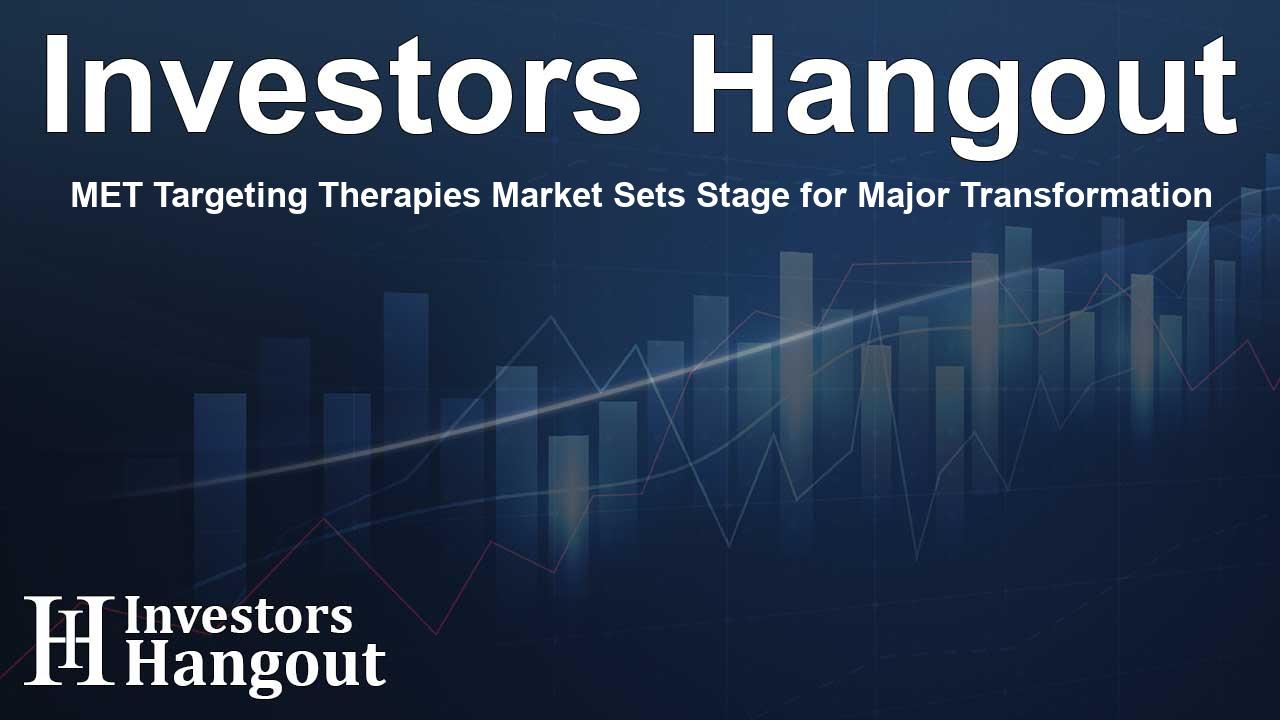MET Targeting Therapies Market Sets Stage for Major Transformation

The Emerging Landscape of MET Targeting Therapies
The MET targeting therapies market is on the brink of significant expansion. With increasing cancer diagnoses and heightened awareness surrounding MET-targeting options, industry stakeholders are poised for transformative changes. Companies are exploring various MET-targeted therapies under clinical trials, promising a diversified arsenal for practitioners and patients alike.
Current Trends Influencing Market Dynamics
The movement towards targeted therapies has switched the paradigm in oncology, changing how complex cancers are managed. Relevant conditions such as colorectal cancer, gastric cancer, pancreatic cancer, and non-small cell lung cancer (NSCLC) are seeing shifts in treatment methodologies due to advancements in targeted drugs. This evolution emphasizes the importance of molecular profiling to pinpoint actionable mutations for tailored therapeutic strategies.
Patient Statistics and Implications
In 2023, there were approximately 531,800 reported cases of non-small cell lung cancer across major global markets, highlighting the pressing need for innovative solutions. It is estimated that up to 6% of these patients exhibit MET alterations, such as METex14 skipping and MET amplification. Furthermore, around 25% of patients with EGFR wild-type NSCLC have tumors that overexpress the c-Met protein, indicating potential pathways for targeted treatment options.
Regulatory Approvals and First-Line Treatments
In recent years, multiple MET-tyrosine kinase inhibitors (TKIs) have secured approval from regulatory authorities, fundamentally altering treatment protocols for patients with METex14-positive NSCLC. Among these, TABRECTA (capmatinib) and TEPMETKO (tepotinib) are leading the charge as recommended first-line therapies for specific MET alterations.
Key Players and Innovations in MET Targeting Therapies
Industry leaders such as AstraZeneca, AbbVie, and Regeneron Pharmaceuticals are developing various novel MET-targeting therapies. The competition is driving innovation, with several companies focusing on improving the efficacy and safety of drugs through cutting-edge research and clinical trials.
Therapies in Development
Promising therapies in the pipeline include ORPATHYS (savolitinib), Telisotuzumab Vedotin, APL-101, REGN5093, and MYTX-011. These novel treatments are anticipated to respond to unmet medical needs across diverse patient populations, thereby generating hope for favorable outcomes.
The Role of Antibody-Drug Conjugates
Antibody-drug conjugates (ADCs) emerge as a novel treatment strategy for cancers that express MET. Particularly, AbbVie leads this area with two ongoing projects targeting c-Met, showcasing the potential of coupling precise targeting with therapeutic efficacy.
Market Dynamics and Future Outlook
The future trajectory of the MET targeting therapies market hinges heavily on ongoing innovations and the successful navigation of regulatory pathways. Enhanced understanding of MET’s role in cancer progression and drug resistance is paving the way for next-generation therapies.
Collaborations Fueling Growth
Strategic partnerships between biotech firms and larger pharmaceutical companies are essential in catalyzing advancements in MET targeting therapies. Collaborative efforts are streamlining clinical development timelines and facilitating regulatory approvals, ensuring that patients benefit from novel interventions swiftly.
Challenges Ahead
Despite the advancements, the market is not devoid of challenges. Pricing, reimbursement, and access to these therapies are pivotal considerations, particularly in regions where healthcare budgets are constrained. The ability to overcome these hurdles will determine the market’s ultimate success.
Frequently Asked Questions
What is the MET targeting therapies market?
The MET targeting therapies market focuses on treatments specifically designed to target the MET receptor, significant in various cancers, including NSCLC, enhancing patient outcomes.
Why is the MET targeting therapies market growing?
This market is growing due to increased cancer diagnoses, advancements in targeted therapies, and a broader understanding of molecular profiles for personalized treatment pathways.
What companies are leading in MET targeting therapies?
Key players include AstraZeneca, AbbVie, Regeneron Pharmaceuticals, and several others dedicated to innovative MET-targeting treatments.
What types of treatments are available?
The market features various treatment modalities, including MET-TKIs, monoclonal antibodies, and antibody-drug conjugates aimed at effectively managing MET-driven cancers.
What challenges does the market face?
Challenges include pricing, reimbursement processes, and ensuring access to therapies, particularly in regions with strict healthcare budgets.
About Investors Hangout
Investors Hangout is a leading online stock forum for financial discussion and learning, offering a wide range of free tools and resources. It draws in traders of all levels, who exchange market knowledge, investigate trading tactics, and keep an eye on industry developments in real time. Featuring financial articles, stock message boards, quotes, charts, company profiles, and live news updates. Through cooperative learning and a wealth of informational resources, it helps users from novices creating their first portfolios to experts honing their techniques. Join Investors Hangout today: https://investorshangout.com/
Disclaimer: The content of this article is solely for general informational purposes only; it does not represent legal, financial, or investment advice. Investors Hangout does not offer financial advice; the author is not a licensed financial advisor. Consult a qualified advisor before making any financial or investment decisions based on this article. The author's interpretation of publicly available data shapes the opinions presented here; as a result, they should not be taken as advice to purchase, sell, or hold any securities mentioned or any other investments. The author does not guarantee the accuracy, completeness, or timeliness of any material, providing it "as is." Information and market conditions may change; past performance is not indicative of future outcomes. If any of the material offered here is inaccurate, please contact us for corrections.